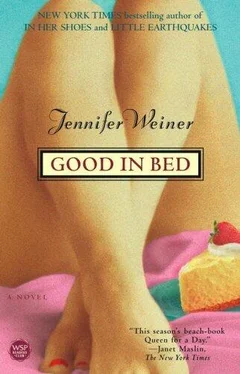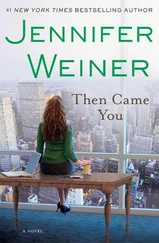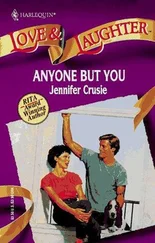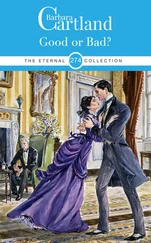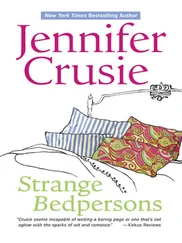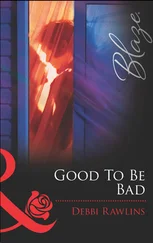“So what did you do today?” he asked me.
“Went for a bike ride, up to Chestnut Hill,” I said. “Thought about you…”
Something flickered across his face then. Something bad.
“Look,” he said quietly. “I ought to tell you something. When I asked if you wanted to have a beer with me… well, I told you I was new to the neighborhood… I mean, I was really just looking for… you know. For friends. For people to hang out with.”
The calamari turned into a lead ball in my stomach. “Oh.”
“And I guess I didn’t make that clear enough… that, I mean that this isn’t a date or anything… oh, God,” he said. “Don’t look at me like that.”
Don’t cry, I told myself. Don’t cry don’t cry don’t cry. How had I misread this so badly? I was pathetic. A walking joke. I wanted Bruce back. Hell, I wanted my mother. Don’t cry don’t cry don’t cry.
“Your eyes,” he said softly. “Your eyes are killing me.”
“I’m sorry,” I said dumbly. Apologizing as always. This cannot get any worse, I thought. Steve stared over my head, out the window.
“Hey,” he said, “isn’t that your dog?”
I turned, and, sure enough, there was Samantha, and Nifkin, both peering through the window. Sam looked impressed. As I stared, she flashed me a quick thumbs-up.
“Will you excuse me?” I murmured. I stood up, forcing my feet to move. In the ladies’ room I splashed cold water on my face, concentrating on not breathing, feeling the tears I couldn’t cry mass behind my forehead and instantly transform themselves into a headache. I considered the night ahead: dinner, then we were supposed to go see the latest world-ending disaster flick at the multiplex. But I couldn’t. I couldn’t spend the whole night sitting next to a guy who’d just declared himself an un-date. And maybe that made me too sensitive, or ridiculous, but the truth was, I couldn’t do it.
I went to the kitchen and found our waitress.
“Almost ready,” she said, then looked at my face. “Oh, God… what? He’s gay. He’s an escaped convict. He used to date your mother.”
“Along those lines,” I said.
“Want me to tell him you’re sick?”
“Yeah,” I said, then thought again. “No. Tell you what… pack up the food, and don’t tell him anything. Let’s see how long he sits there.”
She rolled her eyes. “That bad?”
“There’s another way out of here, right?”
She pointed to the fire exit, which was propped open by a chair containing a busboy on a break. “Go for it,” she said, and a minute later, clutching two to-go containers and what remained of my pride, I slunk past the busboy and out into the night. My head was pounding. Fool, I thought fiercely. Idiot. Stupid, stupid idiot to think that somebody who looks like that would be interested in someone who looks like you.
I got upstairs, dumped the food, took off my dress, pulled on my ratty overalls, thinking furiously that I probably looked like Andrea Dworkin. I stomped down the stairs, out the door, and started walking, first down to the river, then north, toward Society Hill and Old City, and finally, west toward Rittenhouse Square.
Part of me – the reasonable part – was thinking that this was not a big thing, just a minor bump on life’s bicycle path, and that he was the idiot, not me. The single guy, he’d said. Was I wrong to think that he was asking me out on a bona fide date? And so what if this wasn’t a date after all? I’d had dates before. I’d even had boyfriends. It was completely reasonable to think that I’d have them both again, and this guy wasn’t worth another second of my time.
But another part – the shrill, hysterical, hypercritical, and, unfortunately, much louder part – was saying something else entirely.
That I was dumb. That I was fat. That I was so fat that nobody would ever love me again and so dense that I couldn’t see it. That I’d been a fool, or, worse, been made a fool of. That Steve, the Teva-wearing engineer, was probably sitting at an empty table, eating calamari and laughing to himself about big, dumb Cannie.
And who was I going to tell? Who could comfort me?
Not my mother. I couldn’t really talk to her about my love life after I’d made it so clear that I didn’t approve of hers. And plus, with Bruce’s column, she’d learned enough about my after-dark activities for the time being.
I could tell Samantha, certainly, but she’d think I was crazy. “Why are you assuming this is about the way you look?” she’d demand, and I’d mutter that it could probably have been about something else, or just a plain old misunderstanding, all the while feeling the truth in my bones, the Gospel according to my father: I was fat and I was ugly and nobody would ever love me. And it would be embarrassing. I wanted my friends to think of me as someone who was smart and funny and capable. I didn’t want them to feel sorry for me.
What I wanted to do was call Bruce. I wouldn’t tell him about this latest humiliation – I didn’t want his pity, either, or for him to think I’d come crawling back, or was planning to, simply because some fuzzy-legged jerk had rejected me – but I wanted to hear his voice. No matter what he’d said in Moxie, no matter how he’d shamed me. After three years, he knew me better than probably anyone else in the world, except Samantha, and at that moment, standing on the sidewalk on 17th and Walnut, I wanted to talk to him so badly that I got weak in the knees.
I hurried home and heaved myself up the stairs two at a time. Sweaty, hands shaking, I sprawled on the bed and reached for the phone, punching in his number as fast as I could. He picked up instantly.
“Hey, Bruce,” I began.
“Cannie?” His voice sounded strange. “I was just going to call you.”
“Really?” I felt a small spark of hopefulness flare in my chest.
“I just wanted to let you know,” he began, and his voice dissolved into harsh, ragged sobs. “My father died this morning.”
I don’t remember what I said then. I remember that he told me the details: He’d had a stroke and he’d died in the hospital. It had been very fast.
I was crying, Bruce was crying. I couldn’t remember when I’d felt so horrible about something. It was so unfair. Bruce’s father was a wonderful man. He had loved his family. He had even, I thought, maybe loved me, too.
But even as I was feeling horrible, I felt the spark growing. He’ll get it now, a voice in my head whispered. Once you’ve had a loss like that, doesn’t it change the way you see the world? And wouldn’t it change the way he saw me, my own fractured family, my own lost father? Plus, he’d need me. He’d needed me once before, to rescue him from loneliness, from sexual ignorance and shame… and surely he would need me again to help him get through this.
I imagined us at the funeral, and how I’d hold his hand, how I’d help him, hold him up, be there for him to lean on, the way I wished I could have leaned on him. I imagined him looking at me with new respect and understanding, new consideration, with the eyes of a man, not a boy.
“Let me help. How can I help?” I said. “Do you want me to come over?”
His reply was dismayingly instant. “No,” he said. “I’m going home, and there’s a ton of people there now. It would be weird. Could you come to the funeral tomorrow?”
“Of course,” I said. “Of course. I love you,” I said, the words out of my mouth almost before I’d finished thinking them.
“What does that mean?” he asked me, still crying.
To my credit, I recovered fast. “That I want to be there for you… and help you any way I can.”
“Just come tomorrow,” he said dully. “That’s all you can do right now.”
Читать дальше
